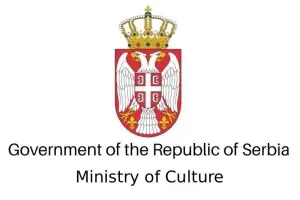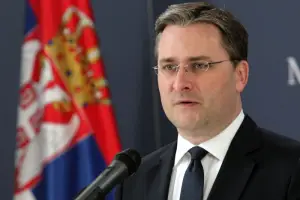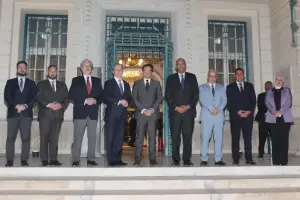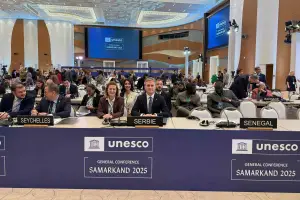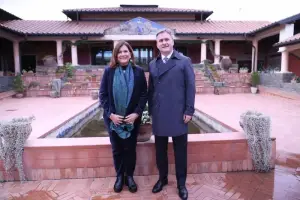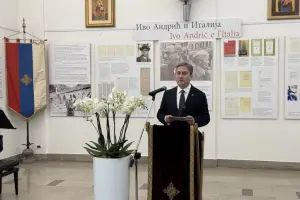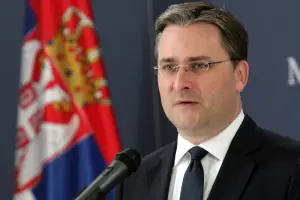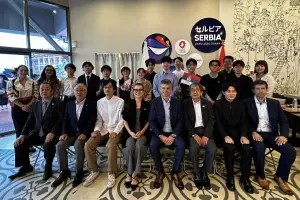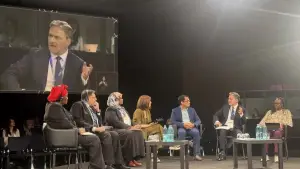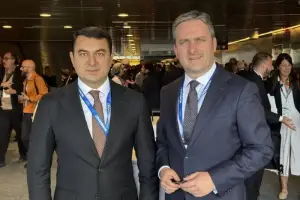Q:
A:
Faster internet for whole Serbia
Belgrade,
4 April 2012
The Ministry of Culture, Media and Information Society announced that the National Commission on Broadband and Digital Development has been established today.
The Commission’s main task will be to promote the importance of broadband internet access.
The Commission is modelled after the global Broadband Commission for Digital Development whose member is also Serbian State Secretary for the digital agenda Jasna Matic.
The founding meeting in Belgrade was attended by Secretary General of the International Telecommunication Union (ITU) Hamadun Toure, who is in Belgrade on 3-5 April, as a guest of the Digital Agenda.
The global Broadband Commission for Digital Development was founded in 2010 by ITU and the UN Organisation for Education, Science and Culture (UNESCO).
The Commission aims to promote broadband access and make it an universal and generally accepted standard for the development of society and economy in Serbia.
In response to the global economic crisis and the way to achieving the Millennium Development Goals, the global Broadband Commission for Digital Development formulated a set of goals to be achieved globally by 2015.
The broadband access should be more accessible to businesses and citizens, while more than 50% of households in each country should have access to the internet, and internet penetration should reach more than 60% of the population.
The promotion of these goals and reaching them in Serbia will be the main task of the National Commission.
Broadband access is significantly changed the way people use and the role of the Internet.
Surveys of the World Bank in 2009 showed an increase of the penetration of broadband connections by 10%, resulting in a GDP increase by 1.3%.
Broadband access is the basis for the provision of electronic services which contribute to the development of society, facilitate communication and increase the accessibility of public administration to citizens (e-government), affect the process of learning (e-learning), provide faster and better services in health care ( e-health) and allow trade and payments in the global framework (e-commerce).
At the same time, broadband access has become an important element in the development of rural, less developed and remote areas, as well as the development of industrial zones and economic connections in the region of a country.
Application of new access technologies improve the quality of life by simplifying communication and providing faster access to information, access to new forms of entertainment and promotion of cultural life.
The development of broadband access provides a substantial contribution to achieving the main development objectives of each country: creating jobs, accelerating economic growth, increasing productivity and ultimately improving long-term economic competitiveness.
Members of the National Commission are prominent representatives of relevant institutions and companies: Director of Telekom Srbija Branko Radujko, CEO of Telenor Kjell Morten Johnsen, CEO of VIP Mobile Thanasis Katsiroumpa, CEO of SBB Dragica Pilipovic Chaffey, representative of Microsoft in Serbia Dejan Cvetkovic, general manager of PUKOS France Presetnik, member of the Board of the Agency for Electronic Communications - RATEL Miroslav Dukic, director of the Centre for Theoretical Physics Djordje Sijacki, president of the National Education Council Desanka Radunovic, president of the National Council for Higher Education Srdjan Stankovic, Vice President of Serbian Chamber of Commerce (PKS) Mihailo Vesovic, Secretary General of the Standing Conference of Towns and Municipalities Djordje Stanicic and CEO of Ericsson Serbia Antonio Passarella.
Also, committee members include CEO of Cisco Serbian Goran Obradovic, Head of EU Delegation in Serbia Vincent Degert, UN Resident Coordinator in Serbia William Infante, EBRD Director for Serbia Hildegard Gacek, Director of AMRES Zoran Jovanovic, Rector of KONUS University Branko Kovacevic, editor of RTS digital programme Tatjana Citic, CEO and Chairman of the B92 Board Veran Matic, editor-in-chief of daily Blic Veselin Simonovic, managing director of RUV RTV Sinisa Isakov, professor of Economics Danica Popovic, President of ComTrade Group Veselin Jevrosimovic, AmCham President Milos Djurkovic, director of the Research Centre Petnica Vigor Majic and Mathematics High School Director Srdjan Ognjanovic.
The Commission is modelled after the global Broadband Commission for Digital Development whose member is also Serbian State Secretary for the digital agenda Jasna Matic.
The founding meeting in Belgrade was attended by Secretary General of the International Telecommunication Union (ITU) Hamadun Toure, who is in Belgrade on 3-5 April, as a guest of the Digital Agenda.
The global Broadband Commission for Digital Development was founded in 2010 by ITU and the UN Organisation for Education, Science and Culture (UNESCO).
The Commission aims to promote broadband access and make it an universal and generally accepted standard for the development of society and economy in Serbia.
In response to the global economic crisis and the way to achieving the Millennium Development Goals, the global Broadband Commission for Digital Development formulated a set of goals to be achieved globally by 2015.
The broadband access should be more accessible to businesses and citizens, while more than 50% of households in each country should have access to the internet, and internet penetration should reach more than 60% of the population.
The promotion of these goals and reaching them in Serbia will be the main task of the National Commission.
Broadband access is significantly changed the way people use and the role of the Internet.
Surveys of the World Bank in 2009 showed an increase of the penetration of broadband connections by 10%, resulting in a GDP increase by 1.3%.
Broadband access is the basis for the provision of electronic services which contribute to the development of society, facilitate communication and increase the accessibility of public administration to citizens (e-government), affect the process of learning (e-learning), provide faster and better services in health care ( e-health) and allow trade and payments in the global framework (e-commerce).
At the same time, broadband access has become an important element in the development of rural, less developed and remote areas, as well as the development of industrial zones and economic connections in the region of a country.
Application of new access technologies improve the quality of life by simplifying communication and providing faster access to information, access to new forms of entertainment and promotion of cultural life.
The development of broadband access provides a substantial contribution to achieving the main development objectives of each country: creating jobs, accelerating economic growth, increasing productivity and ultimately improving long-term economic competitiveness.
Members of the National Commission are prominent representatives of relevant institutions and companies: Director of Telekom Srbija Branko Radujko, CEO of Telenor Kjell Morten Johnsen, CEO of VIP Mobile Thanasis Katsiroumpa, CEO of SBB Dragica Pilipovic Chaffey, representative of Microsoft in Serbia Dejan Cvetkovic, general manager of PUKOS France Presetnik, member of the Board of the Agency for Electronic Communications - RATEL Miroslav Dukic, director of the Centre for Theoretical Physics Djordje Sijacki, president of the National Education Council Desanka Radunovic, president of the National Council for Higher Education Srdjan Stankovic, Vice President of Serbian Chamber of Commerce (PKS) Mihailo Vesovic, Secretary General of the Standing Conference of Towns and Municipalities Djordje Stanicic and CEO of Ericsson Serbia Antonio Passarella.
Also, committee members include CEO of Cisco Serbian Goran Obradovic, Head of EU Delegation in Serbia Vincent Degert, UN Resident Coordinator in Serbia William Infante, EBRD Director for Serbia Hildegard Gacek, Director of AMRES Zoran Jovanovic, Rector of KONUS University Branko Kovacevic, editor of RTS digital programme Tatjana Citic, CEO and Chairman of the B92 Board Veran Matic, editor-in-chief of daily Blic Veselin Simonovic, managing director of RUV RTV Sinisa Isakov, professor of Economics Danica Popovic, President of ComTrade Group Veselin Jevrosimovic, AmCham President Milos Djurkovic, director of the Research Centre Petnica Vigor Majic and Mathematics High School Director Srdjan Ognjanovic.

